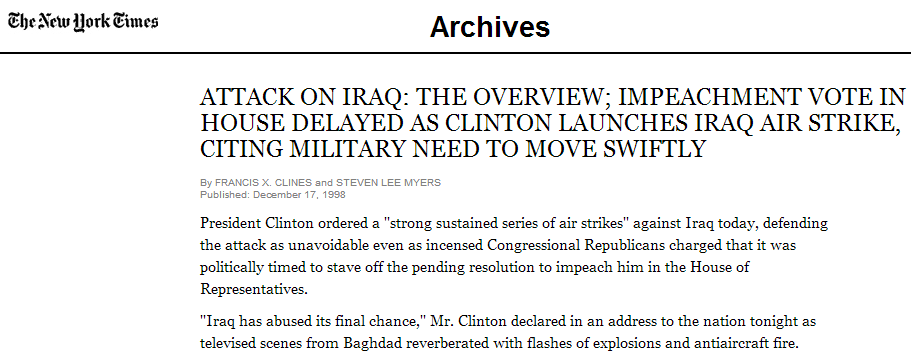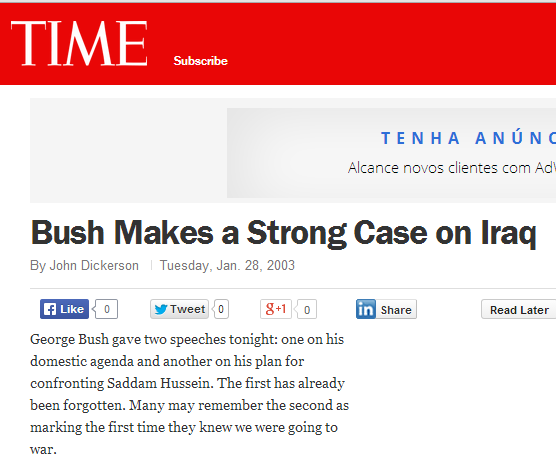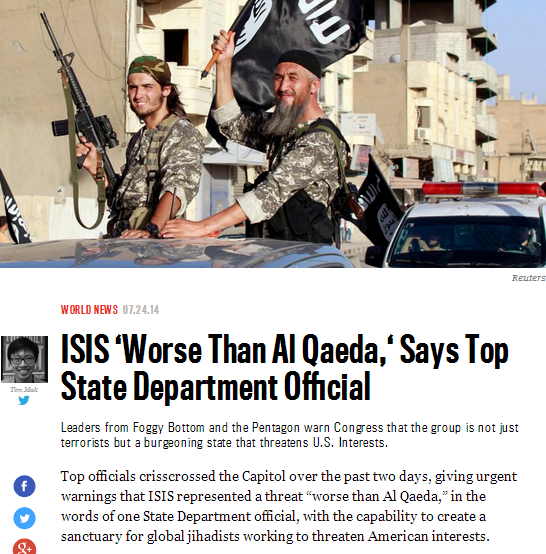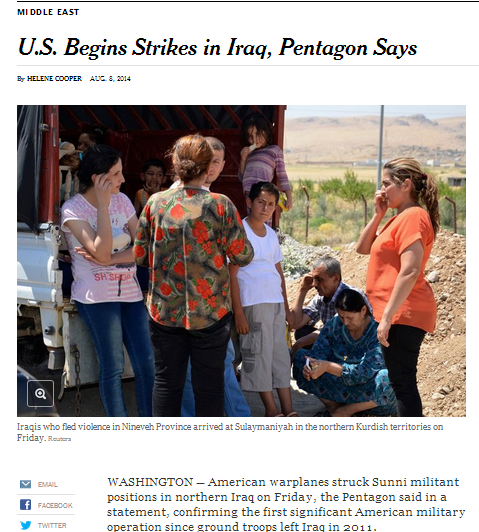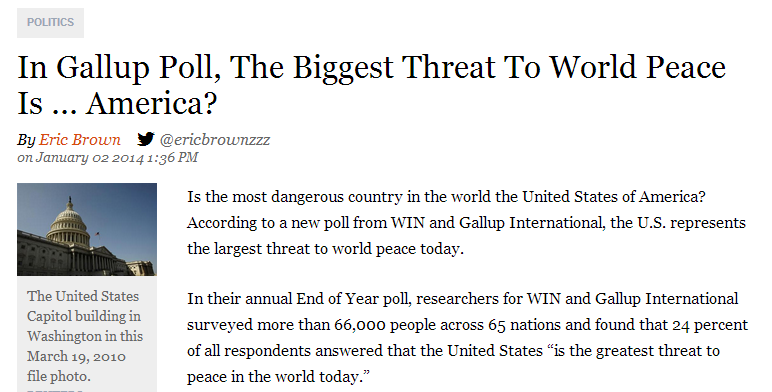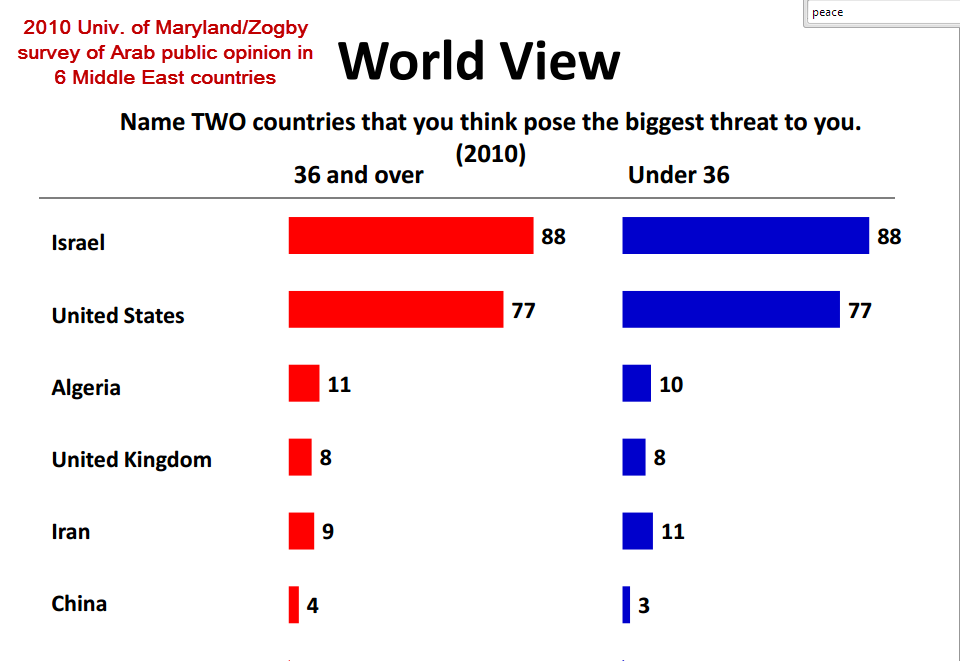U.S. “Humanitarian” Bombing of Iraq: A Redundant Presidential Ritual
MIDDLE EAST AND NORTH AFRICA, 11 Aug 2014
Glenn Greenwald – The Intercept
Associated Press, December 1, 1990:
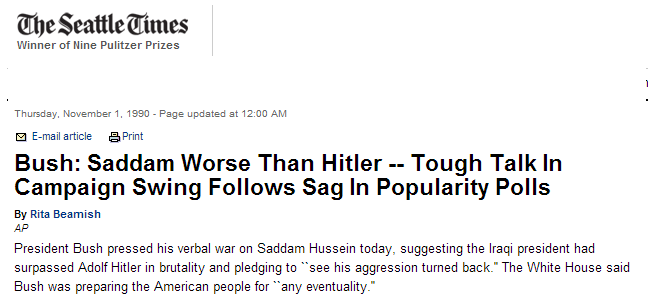 New York Times, January 17, 1991:
New York Times, January 17, 1991:
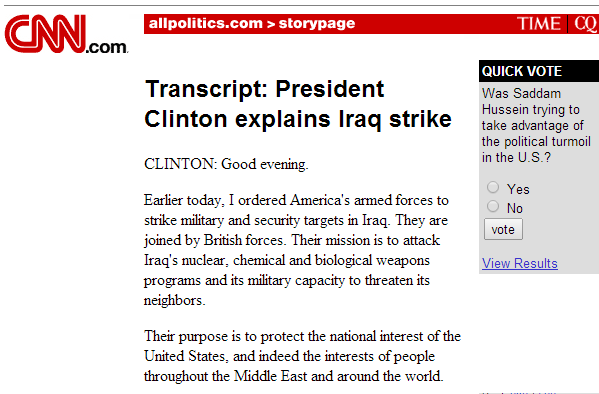 New York Times, December 17, 1998:
New York Times, December 17, 1998:
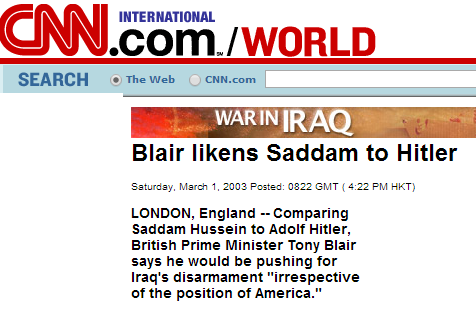 Time, John Dickerson, January 28, 2003:
Time, John Dickerson, January 28, 2003:
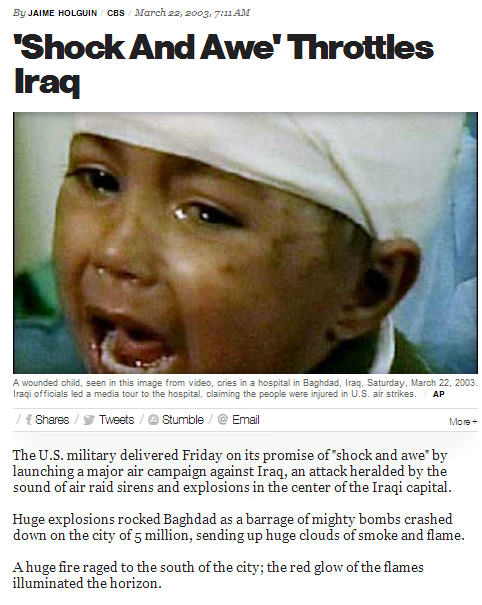 The Daily Beast, July 24, 2014:
The Daily Beast, July 24, 2014:
International Business Times, January 2, 2014:
There are several brief points worth noting about all of this:
(1) For those who ask “what should be done?,” has the hideous aftermath of the NATO intervention in Libya – hailed as a grand success for “humanitarian interventions” – not taught the crucial lessons that (a) bombing for ostensibly “humanitarian” ends virtually never fulfills the claimed goals but rather almost always makes the situation worse; (b) the U.S. military is not designed, and is not deployed, for “humanitarian” purposes?; and (c) the U.S. military is not always capable of “doing something” positive about every humanitarian crisis even if that were really the goal of U.S. officials?
The suffering in Iraq is real, as is the brutality of ISIS, and the desire to fix it is understandable. There may be some ideal world in which a superpower is both able and eager to bomb for humanitarian purposes. But that is not this world. Just note how completely the welfare of Libya was ignored by most intervention advocates the minute the fun, glorious, exciting part – “We came, we saw, he died,” chuckled Hillary Clinton – was over.
(2) It is simply mystifying how anyone can look at U.S. actions in the Middle East and still believe that the goal of its military deployments is humanitarianism. The U.S. government does not oppose tyranny and violent oppression in the Middle East. To the contrary, it is and long has been American policy to do everything possible to subjugate the populations of that region with brutal force – as conclusively demonstrated by stalwart U.S. support for the region’s worst oppressors. Or, as Hillary Clinton so memorably put it in 2009: “I really consider President and Mrs. Mubarak to be friends of my family.”
How can anyone believe that a government whose overt, explicit policy is “regime continuity” for Saudi Arabia, and who continues to lend all sorts of support to the military dictators of Egypt, is simultaneously driven by humanitarian missions in the region?
(3) “Humanitarianism” is the pretty packaging in which all wars – even the most blatantly aggressive ones – are wrapped, but it is almost never the actual purpose. There are often numerous steps the U.S. could take to advance actually humanitarian goals, but those take persistence and resources, and entail little means of control, and are thus usually ignored in favor of blowing things and people up with Freedom Bombs.
(4) Note how even the pretenses of constitutional democracy are now dispensed with: there is a reasonable legal debate over legality, but in essence: the President has the power to order bombing of Iraq because he decides it should happen.
(5) Perhaps having Israel and the U.S. simultaneously bombing Arabs in different countries – yet again – will create some extremely negative consequences?
(6) This above-documented parade of “Saddam-is-worse-than-Hitler” campaigns was surrounded by stints of U.S. arming and funding of the very same Saddam (the same, of course, was true of the Taliban precursors, Gadhaffi, Iran, Manuel Noriega, and virtually every other Latest Villain who needed to be bombed; the US was roughly allied with ISIS allies in Syria and American allies fund ISIS itself). The propaganda has gone from “pulling babies from incubators: as bad as Hitler” to “rape rooms: worse than Hitler” to the new slogan: “worse than al-Qaeda!” What’s left?
For quite some time, it was Mahmoud Ahmadinejad – the democratically elected president of Iran who left office peacefully at the end of his term and who never actually invaded anybody – who was The New Hitler. As all of this demonstrates, there certainly are some heinous, violent people in the world: often including America’s closest allies and the ones who unleash the violence documented here, as well as those at whom that violence is directed. But perhaps some perspective and serious skepticism is warranted the next time we’re relentlessly bombarded with messaging about The New Greatest Villainous Threat in History – and especially manipulative accusations that opposition to U.S. military attack is indicative of support for those New Villains – as a means to secure acquiescence to the next bombing campaign.
(7) Maybe this and this, rather than humanitarianism, is a more significant influence in this new bombing campaign? Targeted strikes against ISIS is obviously not remotely the same as a full-scale invasion of Iraq, but whatever else is true, and whatever one’s opinions are on this latest bombing, it is self-evidently significant that, as the NYT’s Peter Baker wrote today, “Mr. Obama became the fourth president in a row to order military action in that graveyard of American ambition” known as Iraq.
_____________________________
Glenn Greenwald is a journalist, constitutional lawyer, commentator, and author of three New York Times best-selling books on politics and law. His fifth book, No Place to Hide, about the U.S. surveillance state and his experiences reporting on the Snowden documents around the world, will be released in April 2014. Prior to his collaboration with Pierre Omidyar, Glenn’s column was featured at Guardian US and Salon. He was the debut winner, along with Amy Goodman, of the Park Center I.F. Stone Award for Independent Journalism in 2008, and also received the 2010 Online Journalism Award for his investigative work on the abusive detention conditions of Chelsea Manning. For his 2013 NSA reporting, he received the Gannett Foundation award for investigative journalism and the Gannett Foundation watchdog journalism award; the Esso Premio for Excellence in Investigative Reporting in Brazil (the first non-Brazilian to win), and the Electronic Frontier Foundation’s Pioneer Award. Along with Laura Poitras, Foreign Policy magazine named him one of the top 100 Global Thinkers for 2013. He lives in Rio, Brazil.
Go to Original – firstlook.org
DISCLAIMER: The statements, views and opinions expressed in pieces republished here are solely those of the authors and do not necessarily represent those of TMS. In accordance with title 17 U.S.C. section 107, this material is distributed without profit to those who have expressed a prior interest in receiving the included information for research and educational purposes. TMS has no affiliation whatsoever with the originator of this article nor is TMS endorsed or sponsored by the originator. “GO TO ORIGINAL” links are provided as a convenience to our readers and allow for verification of authenticity. However, as originating pages are often updated by their originating host sites, the versions posted may not match the versions our readers view when clicking the “GO TO ORIGINAL” links. This site contains copyrighted material the use of which has not always been specifically authorized by the copyright owner. We are making such material available in our efforts to advance understanding of environmental, political, human rights, economic, democracy, scientific, and social justice issues, etc. We believe this constitutes a ‘fair use’ of any such copyrighted material as provided for in section 107 of the US Copyright Law. In accordance with Title 17 U.S.C. Section 107, the material on this site is distributed without profit to those who have expressed a prior interest in receiving the included information for research and educational purposes. For more information go to: http://www.law.cornell.edu/uscode/17/107.shtml. If you wish to use copyrighted material from this site for purposes of your own that go beyond ‘fair use’, you must obtain permission from the copyright owner.
Read more
Click here to go to the current weekly digest or pick another article:
MIDDLE EAST AND NORTH AFRICA:

